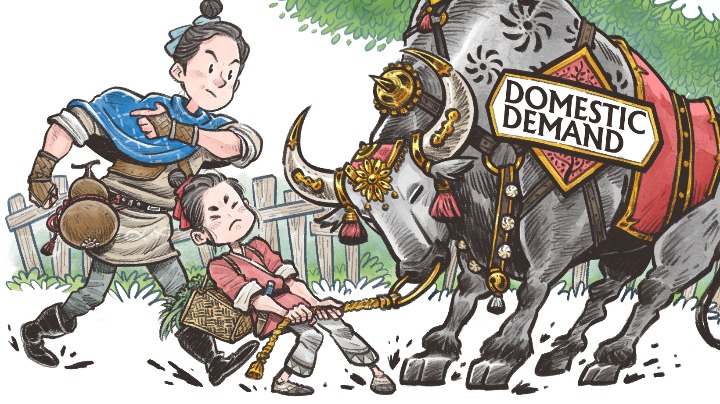### Summary
Beijing is focusing on domestic consumption to offset low external demand.
### Facts
- 🏭 Beijing aims to boost domestic consumption to counterbalance weak foreign demand.
- 🌴 Shandong becomes the latest Chinese province to promote annual leave, despite being legally guaranteed, only 60% of Chinese workers take it.
- 📜 Beijing has recently released measures to encourage holiday and leisure spending.
China's economic challenges, including deflationary pressures and a slowdown in various sectors such as real estate, are likely to have a global impact and may continue to depress inflation in both China and other markets, with discounting expected to increase in the coming quarters.
China's economy is struggling and facing a lurching from one economic challenge to the next due to failures in economic policy and the centralization of power under President Xi Jinping, which is causing bad decision-making and a decline in living standards.
China faces challenges in rebalancing its economy towards increased consumer spending due to the economic growth model that relies heavily on investment in property, infrastructure, and industry, as well as the reluctance of households to spend and the limited social safety net; implementing demand-side measures would require difficult decisions and potential short-term pain for businesses and the government sector.
China is implementing measures to boost household spending, ease property policies, increase car purchases, improve conditions for private businesses, and bolster financial markets in an effort to revive the economy's recovery and improve the business environment.
China's economic model, driven by industrialization and exports, is showing weaknesses with an imbalanced economy, low demand, slumping trade, and a struggling property sector, highlighting the need for structural reforms to boost domestic consumption and confidence.
China needs to fully utilize policy space to bolster economic growth and market expectations by making significant adjustments in fiscal and monetary policies, according to a senior economist and political adviser. The economist emphasizes the importance of sending strong signals to the market and considers options such as interest rate cuts, increased deficit-to-GDP ratio, and infrastructural improvements to address economic challenges caused by global demand stagnation and tightened US monetary measures.
China's economy is facing challenges, with youth unemployment at a record high, mismatched skills in the job market, and the risk of falling into the middle-income trap, jeopardizing President Xi Jinping's goal of turning China into a high-income nation.
China's economy is struggling due to an imbalance between investments and consumption, resulting in increased debt and limited household spending, and without a shift towards consumption and increased policy measures, the economic slowdown may have profound consequences for China and the world.
China has lowered requirements for homebuyers in an attempt to revive its struggling property market and address the financial crisis.
China is planning to relax home-purchase restrictions and implement new measures to address the debt crisis in its property sector, which accounts for a quarter of its economy, in an effort to boost consumer demand.
China's measures to support the property sector, such as lowering mortgage rates, have limited impact on consumer spending due to the dire economic outlook and lack of longer-term reforms, highlighting the need for resources to be transferred to consumers from other sectors of the economy.
China's recent policies to stabilize the property sector may not be enough to stimulate real economic growth, although they could generate demand, according to analysts.
Signs of improvement in China's economy, such as improving credit demand and easing deflationary pressures, may not be enough to stabilize the economy due to bigger concerns of decreasing affordability, tight wages, and rising costs that have not been addressed. A comprehensive policy revamp may be necessary for China's economy to recover.
China is facing challenges in its economic recovery, including calls for policy clarity, concerns over over-reliance on Chinese EVs, inadequate scientific literacy, declining luxury spending by the middle class, and a shrinking US middle class.
China is seeking to increase productivity and efficiency in its industrial northeast region, facing economic challenges such as an aging population, declining birthrate, and a real estate crisis, but some economists argue that the government's focus on industrial investments is outdated and lacks measures to stimulate consumer confidence and spending.
China's property crisis poses significant challenges for an economy heavily reliant on real estate, although there are some sectors that may benefit from the situation.
